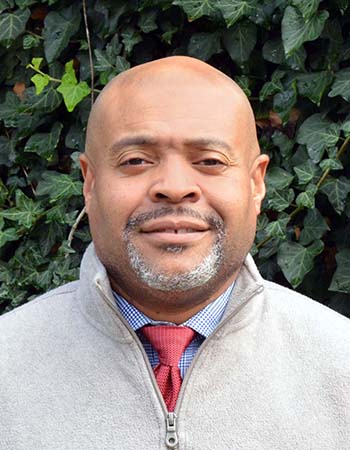 Kim King ’99
Kim King ’99
Assistant Director of the MXIBS
Kim King is a 1999 Wabash graduate, who majored in religion, played varsity football and basketball, and was active in the MXIBS. He earned his Master of Divinity degree at Emory University.
Kim has recently served as Chief of Staff at Payne Theology Seminary in Ohio. In that role, he guided strategic conversations designed to increase institutional positioning and developed key relationships in the community. He also served Payne as its Director of Advancement.
King served his alma mater for a decade in the Admissions Office, dedicating his professional career to recruiting young men to Wabash College. He has also held positions at Ball State University and Chicago Theological Seminary.
Why did you choose to attend Wabash College?
As much as I chose Wabash College, Wabash College seemed to choose me. My desire to attend a small college with a strong academic and athletic reputation was equally met by a sense that the College was prepared to partner in my personal development.
What impact did the MXIBS have on you as a Wabash student?
I first learned about the MXIBS through the juniors and seniors who mentored and challenged me to match Wabash’s rigor. From there, the Institute—especially through the “fathering of Horace Turner”—offered me a place to be unapologetically me.
Who were your role models as a student and why?
First, the upperclassmen of the MXI because they embodied what I could become; second, my peers in my living unit because they challenged me to excel day in and day out.
We like to say that “Wabash will change your life.” How did it change your life?
Wabash changed my life because important component parts—faculty (Religion Department, in particular, staff (especially coaches), and students (my living unit)—helped me find the confidence that my voice mattered as an African-American young man. I was accepted to a top master’s program not because of the person I was when I came in as a freshman but because of the person I was when I graduated from Wabash.
What are your fondest memories from your time at Wabash?
The camaraderie in locker rooms, mentoring young men at the Institute, conversations with professors before and after class, and roughhousing in my living unit.
What advice would you give a young man considering Wabash?
Enjoy having options! This should be a fun experience. But then, also think seriously about the kind of man you want to become. And if it’s the kind of man who will enter the work force or graduate school as a thoughtful leader, then Wabash should be given an even harder look.
What do you say to a prospective student who says Wabash is too small, too rural, and too white?
A concern about the broader community is real and should be a factor. But an even bigger question about one’s choice for college is if/how the learning experience leads to personal enrichment and big opportunity. That we change lives and possess leading outcomes speak for themselves.
What advice would you give the parents of a young man considering Wabash?
Think about what “return on investment” means for your son and family. For Wabash, it means not only presenting sons with excellent career services and incredibly high first-destination rates, but also a life-changing brotherhood with access to equally engaging professors and caring alumni along the way.
How has the MXIBS changed over the years?
The Institute is still a place that inspires tough conversation about identity in America and where all students, especially those of African descent and from underserved communities, find particular space to have those important conversations. I appreciate, nonetheless, how current leadership in the Institute and at the College try to build on this legacy in a way that raises the profile of the MXIBS.
You worked at Wabash in the Admissions Office earlier in your career. Why did you choose to return to Wabash as Assistant Director of the MXIBS?
I didn’t choose to return to Wabash as an “Assistant Director of the MXIBS” in a narrow sense though I honor its position in the life and structure of the organization. Instead, I chose to return to an institutional commitment, forged out of “restoring hope and trust in our transformational liberal arts education” for young men of color of which the MXIBS and its brothers play an unequivocally pivotal role on campus and beyond. Change agency rests at the root of my return.
